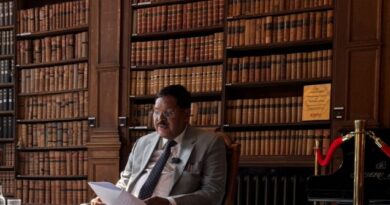Wearing of Hijab or Head Scarf is Not a Part of ‘Essential Religious Practice’ of Islamic Faith; Says Karnataka High Court Dismisses Petition Against Hijab
(Judicial Quest News Network)
A three-Judge bench of the Karnataka High Court comprising of Chief Justice Rity Raj Awasthi,Justice Kirishna Dixit, and Justice KM Khazi on Tuesday pronounced the Judgement observing that Hijab is not an essential practice of Islam and the Holy Quran does not contain any such injunctions.
Thus, the students can’t wear hijab while attending classes and have to cater to the prescribed uniform. The petitioners are likely to move Supreme Court soon.
A full bench of the High Court further held that prescription of school uniform by the State is a reasonable restriction the students’ rights under Article 25 and thus, the Government Order issued by the Karnataka government dated February 5, is not violative of their rights.
A group of students from Udupi had approached to the court challenging the ban on headscarves in the state’s educational institutions. The students had contended that there is no law that prohibits the use of the hadsraves in educational institutions.
The student’s further argued that the Hijab is protected under the religious freedoms granted by the constitution and no college development body is equipped to take a call on whether it can be banned in view of public order violation.
The Karnataka government has told the court that there is no restriction on wearing hijab in India except reasonable restrictions subject to institutional discipline.
The judgement has significantly marked a paradigm shift in the interpretation of Article 25 of the Constitution. It restates the position of law as held by SC in Sabrimala (case) by saying that what is essentially religious is not sufficient but what is required to be shown is essential to religion Sai Karnataka Advocate General.
Advocate General appearing for the State argues that (i) wearing of hijab does not fall within essential religious practise of Isla; (ii) right to wear hijab cannot be traced to freedom of expression under Article 19(1),(a) of the constitution; (iii) Government order dated February 5 empowering college development Committee (CDCs) to prescribe uniform is in consonance with Education Act.
It was further argued that the State’s contention that wearing of Hijab does not stand the test of Constitutional morality and individual dignity lay down by the Supreme Court in Young lawyers Association state of Kerala.
The arguments and hearing before the bench lasted for 11 days, before the verdict was reserved on 25th February, on the very first day of hearing the bench had passed an interim order directing students not to wear hijab, saffron shawls or use any religious flags while attending classes which have a prescribed uniform.




